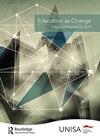南非新自由主义大学的兴起:对课程想象的几点启示
IF 1
4区 教育学
Q3 EDUCATION & EDUCATIONAL RESEARCH
引用次数: 1
摘要
这所位于全球南方的公立大学继续陷入生存的沉睡,努力自我定义/自我诊断其目的、理由、目标和议程。尽管出现了#FeesMustfall、#RhodesMustball,以及最近的#Asinamali学生抗议活动,但南非高等教育继续采用新自由主义和殖民主义的制度改革理念,表现在绩效管理工具的出现和颁布、人口对转型的理解、不连贯/不合逻辑的政策规定、,以及利用技术作为教学手段的替代。在这篇文章中,我尝试做两件事。首先,我批评南非高等教育政策和立法框架在很大程度上是不充分的,本质上是新自由主义的,旨在加强以市场为导向的逻辑和话语。其次,在新自由主义大学之外的思考中,我提出了从非殖民化的角度来看,包容性课程可能是什么样子。在文章的结尾,我对南非新自由主义大学的未来,以及我所认为的非殖民化和变革性课程的出现的潜在影响,进行了一些分别的思考。本文章由计算机程序翻译,如有差异,请以英文原文为准。
The Rise of the Neoliberal University in South Africa: Some Implications for Curriculum Imagination(s)
The public university in the global South continues to be trapped in an existential slumber, struggling to self-define/self-diagnose its purposes, rationales, goals and agenda(s). Despite the emergence of the #FeesMustfall, #RhodesMustFall, and more recently the #Asinamali student protests, South African higher education continues to adopt neoliberal and colonial conceptions of institutional reforms, seen through the emergence and enactment of performance management instruments, demographic understandings of transformation, incoherent/illogical policy prescriptions, and the use of technology as pedagogic replacement. In this article, I attempt to do two things. Firstly, I critique the South African higher education policy and legislative framework as largely inadequate and neoliberal in nature and designed to reinforce market-orientated logics and discourses. Secondly, and in thinking beyond the neoliberal university, I propose what an inclusive curriculum could look like through a decolonial lens. I end the article with some parting thoughts on the future of the neoliberal university in South Africa, and the potential implications for what I see as the emergence of decolonial and transformative curricula.
求助全文
通过发布文献求助,成功后即可免费获取论文全文。
去求助
来源期刊

Education As Change
EDUCATION & EDUCATIONAL RESEARCH-
CiteScore
1.40
自引率
0.00%
发文量
29
审稿时长
24 weeks
期刊介绍:
Education as Change is an accredited, peer reviewed scholarly online journal that publishes original articles reflecting critically on issues of equality in education and on the ways in which educational practices contribute to transformation in non-formal, formal and informal contexts. Critique, mainly understood in the tradition of critical pedagogies, is a constructive process which contributes towards a better world. Contributions from and about marginalised communities and from different knowledge traditions are encouraged. The articles could draw on any rigorous research methodology, as well as transdisciplinary approaches. Research of a very specialised or technical nature should be framed within relevant discourses. While specialised kinds of research are encouraged, authors are expected to write for a broader audience of educational researchers and practitioners without losing conceptual and theoretical depth and rigour. All sectors of education are covered in the journal. These include primary, secondary and tertiary education, adult education, worker education, educational policy and teacher education.
 求助内容:
求助内容: 应助结果提醒方式:
应助结果提醒方式:


